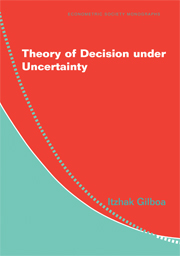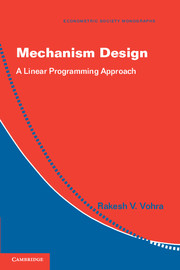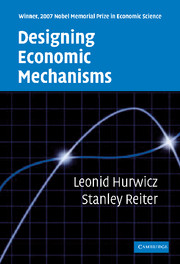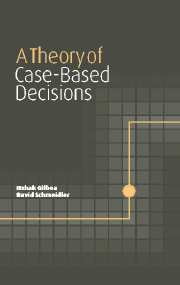Theory of Decision under Uncertainty
This book describes the classical axiomatic theories of decision under uncertainty, as well as critiques thereof and alternative theories. It focuses on the meaning of probability, discussing some definitions and surveying their scope of applicability. The behavioral definition of subjective probability serves as a way to present the classical theories, culminating in Savage's theorem. The limitations of this result as a definition of probability lead to two directions - first, similar behavioral definitions of more general theories, such as non-additive probabilities and multiple priors, and second, cognitive derivations based on case-based techniques.
- First book entirely on decision under uncertainty since Krepps 1988 Notes on the Theory of Choice
- Covers non-classical theories as well as classical ones
- Offers numerous examples, including ones in new axiomatic decision theory
Reviews & endorsements
'This is a fantastic book. It presents an intelligent, rigorous, and thought-provoking treatment of the theory of choice under uncertainty. The combination of philosophical and mathematical approaches is a treat. Graduate students and professional economists alike have much to learn from this book.' Daron Acemoglu, Massachusetts Institute of Technology
'This is a beautifully written book that I recommend to anyone who is interested in understanding the 'what,' 'how,' and 'why' of decision theory. The balance between conceptual issues, formalism, and philosophical underpinnings is unique. It will become a standard reference and text.' Larry Epstein, Boston University
'With his seminal works, Itzhak Gilboa is one of the leading figures in the 'neoclassical' decision theory that in the past 20 years has considerably expanded the scope of the classical theory pioneered by de Finetti, Ramsey, Savage, and von Neumann. This book provides a superb and much-needed introduction to this exciting research area.' Massimo Marinacci, Collegio Carlo Alberto, Italy
'At the heart of most economic analysis is a description of how individuals make decisions. There have been fundamental advances in our understanding of decision making in recent years, and this book provides an extremely accessible explanation of the current state of the field. Perhaps more importantly, it lays out the conceptual underpinnings of decision theory: why the various assumptions in modeling decision making are made and how they affect economic predictions.' Andrew Postlewaite, University of Pennsylvania
'Expected utility theory underlies most of statistics, economics, and finance. But are utility functions and probabilities all that we need to formulate wise decisions? And where do utility functions and probabilities come from? Written by the distinguished creator of new decision theories Itzhak Gilboa, Decision Theory under Uncertainty is a beautifully written critical account of decision theory that answers these and other important questions. Gilboa's work opens doors for both theorists and applied workers.' Thomas Sargent, New York University
'[Gilboa] provides a textbook, but mathematically sophisticated, treatment of the recent developments in Choquet expected utility theory, prospect theory, and maxmin expected utility theory.' History of Economic Thought and Policy
Product details
May 2009Paperback
9780521741231
230 pages
226 × 150 × 15 mm
0.32kg
Available
Table of Contents
- 1. Preface
- 2. Motivating examples
- 3. Free will and determinism
- 4. The principle of indifference
- 5. Relative frequencies
- 6. Subjective probabilities
- 7. A case study
- 8. The role of theories
- 9. Von Neumann and Morgenstern's theorem
- 10. De Finetti's theorem
- 11. Savage's theorem
- 12. The definition of states
- 13. A critique of Savage
- 14. Objectivity and rationality
- 15. Anscombe-Aumann's theorem
- 16. Choquet expected utility
- 17. Prospect theory
- 18. Maxmin expected utility
- 19. Case-based qualitative beliefs
- 20. Frequentism revisited
- 21. Future research.





